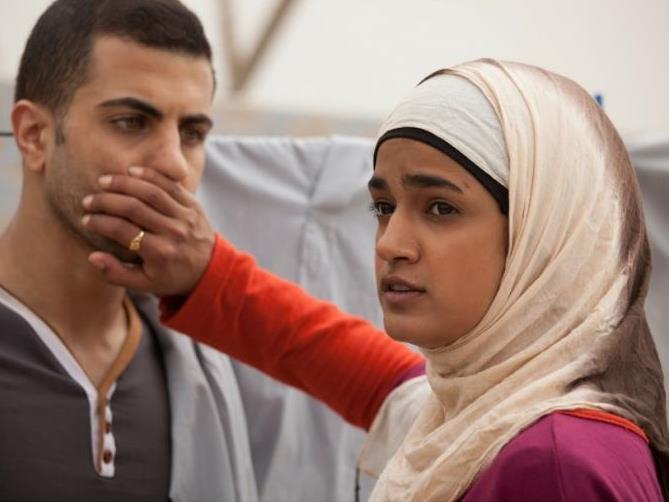“You’ll marry me, even if I don’t have a head?” 18-year-old Layla (debutant Lamis Ammar) is asked by her boyfriend Anwar (Jalal Masrwa, The White City). His seemingly exaggerated words are couched in urgency and offered like a secret, befitting their clandestine relationship and their stolen moment together on a stairwell. Much conspires against their love, including the fact that they hail from distinctive tribes in Southern Israel, with their anxieties heightened after Layla’s mother Jalila (Ruba Blal-Asfour, When I Saw You) discovers their amorous text messages. Layla now proposes to seek approval from her father Suliman (Hitham Omari, Mountain), sparking Anwar’s fears.
Their precarious situation may thrust Sand Storm (Sufat Chol) into action; however this isn’t simply a tale of forbidden love. Commencing with Layla ostensibly carefree, respected by and learning to drive with Suliman, it explores the notions of agency and control that her unsanctioned romance brings to attention — one lacking, the other stridently enforced. Indeed, the scenic car trip offers false hope for the spirited daughter of a strict Bedouin patriarch who, upon their return home, takes another, younger wife and makes Jalila manage the festivities. Accordingly, as her later conversation with Anwar demonstrates, Layla is trapped between fantasy and reality, thinking that her future is her own even despite witnessing her mother’s continual subjugation, blindly believing that her close relationship with her father will mean that he bends his ways, and then discovering otherwise.
That’s the heartbreaking journey that the first feature from writer/director Elite Zexer following shorts Take Note, Fire Department, Bnei-Brak and Tasnim takes audiences on, though the outcome remains apparent to those watching. Contrasting desires for of a different fate with the inevitable path Layla’s story must take, and similarly juxtaposing her plight with that of the protective, oppressed Jalila, Sand Storm offers a portrait of the deep-seeded, societally engrained conflict that continues to rage for Bedouin women — regardless of their generation, and largely absent the opportunity to rebel.
Of course, it’s an easy choice to cast the film’s two key female figures as apparent opposites, with the younger then uncovering just how much they really share; thankfully, it’s also one that proves layered and textured courtesy of the corresponding performances. In an effort lacking in detail fleshing out the tradition or community expectation behind Suliman’s stance — and conspicuously retaining an insular focus on his family, rather than venturing broader — Ammar and Blal-Asfour give their dual, duelling protagonists depths that hammer home the complexities around them. Their exchanges, often adversarial, only typify this, ensuring that little about their status as mother and daughter, as females at the mercy of men, or as women that Layla’s three sisters look up to, is ever as straightforward as it might initially appear.
It’s fitting then, that Zexer and cinematographer Shai Peleg (Blush) stress the rough edges inherent in every sight around them, from sprawling, sandy plains to the haphazard-looking washing strung throughout their yard. In the Sundance Film Festival World Cinematic Dramatic — Grand Jury Prize winner, Layla and Jalila live lives of forced obedience and submission, but there’s nothing about their spirit that can be easily smoothed over, as every patient and precise frame reinforces.
Rating: 3 ½ stars out of 5
Sand Storm (Sufat Chol)
Director: Elite Zexer
Israel, 2016, 87 mins
Release date: December 1
Distributor: Jewish Film Festival
Rated: PG
Actors:
Director:
Format:
Country:
Release:





